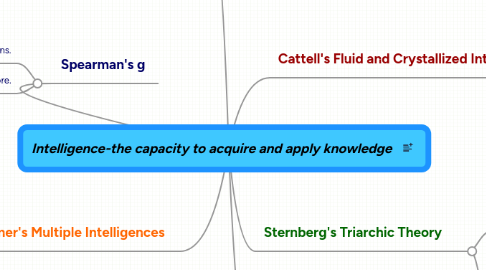
1. Spearman's g
1.1. General factor in intelligence that influences performance in a wide variety of tasks and content domains.
1.2. Evidence indicates that an ability to process information quickly may be at its core.
1.2.1. Substantial correlations between measures of information processing speed and IQ scores are found.
2. Gardner's Multiple Intelligences
2.1. People have several specific abilities, multiple intelligences, that are relatively independent of one another.
2.1.1. linguistic
2.1.2. logical-mathematical
2.1.3. spatial
2.1.4. musical
2.1.5. bodily-kinesthetic
2.1.6. interpersonal
2.1.7. intrapersonal
2.1.8. naturalist
2.2. Are abilities such as music and bodily movement intelligences?
3. Children Acquiring Intelligence
3.1. Hereditary Influences
3.1.1. Twin studies
3.1.1.1. identical twins have similar IQ scores
3.1.2. Certain genetic defects
3.1.3. Adoption studies
3.1.3.1. twins raised in different homes have less similar IQ scores than those raised together
3.2. Environmental Influences
3.2.1. Home environment
3.2.2. Early nutrition
3.2.3. Toxic substances
3.2.4. Early intervention
3.2.5. Formal schooling
4. Cattell's Fluid and Crystallized Intelligence
4.1. Fluid intelligence is the ability to acquire knowledge quickly and then adapt readily to new situations.
4.1.1. Largely the result of inherited biological factors
4.1.2. Peaks in late adolescence and begins to decline in the early 20's.
4.2. Crystalized intelligence is knowledge and skills accumulated from prior experience and schooling.
4.2.1. Influenced by both heredity and environment
4.2.2. Continues to increase throught childhood, adolescence, and most of adulthood
5. Sternberg's Triarchic Theory
5.1. Intelligence involves three factors
5.1.1. Environmental Context
5.1.2. Prior Experiences
5.1.3. Cognitive Processes
5.2. Aspects of theory defined so generally that they are difficult to test empirically
6. Distributed Intelligence
6.1. Thinking facilitated by physical objects and technology, social support, and concepts and symbols of one's culture.
6.2. Theory still in infancy
6.2.1. Still need to delineate the specific ways in which the environment supports intelligent behavior.
6.2.2. Need to determine how great an effect environmental support is likely to have
